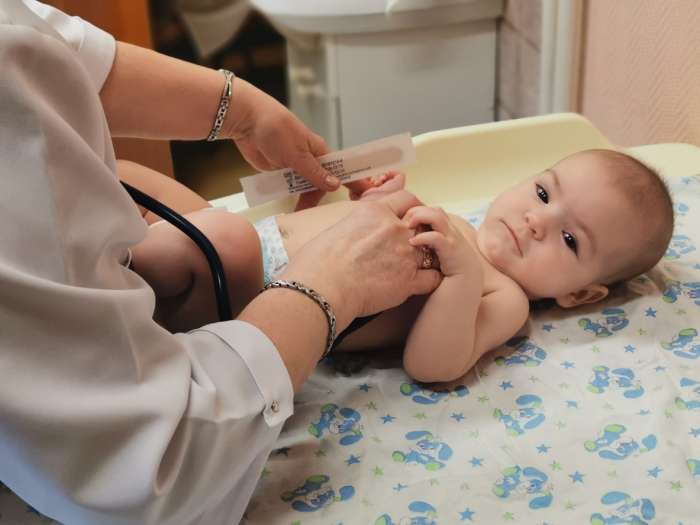You might be pondering the question: “What blood type will my baby have?”
Blood type is inherited from both biological parents. There's no way to be sure what blood type your baby will have without a blood test, but you can narrow down the possibilities if you know your blood type and your partner's.
Related: 7 Traits Babies Inherit From Their Mother
What is Blood Type?
Your blood contains a number of different types of cells, including red blood cells. The function of these cells is to carry oxygen around the body, but they also determine what blood type you have, whether you are A positive or AB negative for example.
Red blood cells have substances on their surfaces called antigens. There are three types of antigens that determine blood type – A type, B type and Rhesus (Rh). The type of antigens that your blood cells have determine what blood type you have.
ABO Blood Group
The ABO system has four major blood groups: A, B, AB, and O. Red blood cells in blood type A have A antigens on their surfaces. Red blood cells in blood type B have B antigens on their surfaces. Red blood cells in blood type AB have both antigens and those in blood type O have no antigen at all.
The Ultimate List of Family Heirlooms to Pass Down to Your Kids One Day
In a world where minimalism and Marie Kondo style tidying up are gaining traction, many families can find themselves clearing out and downsizing. Which leaves us questioning what to save to pass on to our children. Read More
Blood group O is the most common, with 45% of people in the US having this type. 40% have blood group A, 11% blood group B and the remaining 4% have AB blood.
Inheritance and the ABO Gene
ABO blood type is an inherited trait. Every person carries two genes, or alleles, for each trait. One ABO allele is inherited from the father (who passes on one of his two) and the other is inherited from the mother (who passes on one of her two).
Therefore, both parents influence the blood group of their baby.
The two alleles passed on to your baby will make up his genotype. Genotype is the genetic code that you can pass on to your children, but not all alleles in your genotype will show up as traits – the phenotype.
The actual blood type your baby ends up with depends on gene dominance.
For example, a baby who gets a blood type B allele from one parent and a blood type O allele from the other will end up with blood type B because the B allele is dominant.
This means that it is possible for a baby to have a different blood type than both parents.
Here is the full breakdown:
- A is dominant over O
- B is dominant over O
- A and B are co-dominant
How To Predict Your Baby’s ABO Blood Group

If you know what blood group you and your partner have, you can make predictions about what blood group your baby will have by looking at some of the possible combinations of alleles.
Two parents with blood group O
As both the mother and father must have the OO genotype, baby will definitely have blood group O. This is the only combination where we can predict with 100% accuracy what blood group baby will have.
Two parents with blood group A
The parents could be AA or AO. This means that their children could either inherit two alleles, an A and an O, or two Os. They could be blood group A or blood group O. The same pattern would be seen with two parents with blood group B.
Two parents with blood group AB
Here the parents have a 25% chance of having a baby with A, 50% chance of AB, and 25% chance of B blood type.
One parent with blood group A and one with blood group O
When parents have different blood groups predicting the blood group of baby gets more difficult, as there are more possible combinations. In this example, it depends on the genotype of the parent with blood group A - it could be AA or AO.
If they are AA then baby will definitely be AO, and blood group A. If they are AO then this reduces to a 50% chance.
The Rh Factor
The Rhesus (Rh) Factor is a protein found on the surface of red blood cells. Positive blood has the Rhesus protein, while negative blood does not. For example, if your ABO blood group is AB and you are Rh positive, your full blood type is AB positive.
If your ABO blood group is O and you are Rh negative, your blood type is O negative.
There are eight possible blood types when you combine the ABO groups and the Rh groups: A+, A-, AB+, AB-, B+, B-, O+, and O-.
Inheritance and the Rh Factor
The Rh factor is inherited on the RHD gene, with the Rh positive allele being dominant. Even if both parents are Rh positive the baby can be Rh negative.
This is because it's possible that both parents carry an Rh negative allele and they might both pass this allele to the baby. However, if both parents are Rh negative, you can be sure the baby will be too.
- If both parents have Rh positive blood, the baby might be positive or negative.
- If one parent is Rh positive and the other parent is Rh negative the baby might be positive or negative.
- If both parents are Rh negative, the baby will be Rh negative.
How the Rh Factor Affects Pregnancy
If you are Rh negative, it could impact your pregnancy if your baby is Rh positive. This is called Rh incompatibility.
During pregnancy, it is possible for red blood cells from the unborn baby to cross into the mother's blood through the placenta. The mother’s immune system won’t recognize these foreign Rh antigens and produce antibodies (also called immunoglobulins) to attack the cells.
Rh antibodies won't hurt your first pregnancy, but they might harm subsequent pregnancies. In your next pregnancy, these antibodies can cross the placenta and attack the baby's red blood cells, causing life-threatening anemia.
If you are Rh negative and your baby's father is also Rh negative, there is no need to worry about Rh antibodies.
However, if your partner is Rh positive, your doctor will conduct screenings during pregnancy delivery to see if your body is producing antibodies. You may also need an injection containing immune globulins called RhoGAM to stop your body from producing antibodies.
Can A Baby’s Blood Type Be Used to Determine Paternity?
In the first half of the 20th century, testing ABO blood groups were used to help determine the biological father of a child. However, this method could only be used to rule out certain men as potential fathers.
For example, if a baby’s blood group is O then a man with blood group AB couldn’t be the father as he has no O alleles to pass on.
Over time, the discovery of additional blood antigens, such as Rh antigens, MN antigens, and human leukocyte antigens (HLAs), greatly increased the effectiveness of using blood for paternity testing but they still left room for significant error.
If you were to now use a paternity test it would be carried out using a type of DNA testing called DNA fingerprinting, where the DNA of the child is compared to that of the father to see if they share any DNA sequences.
This highly reliable technique was developed in 1984 (Jeffreys et al, 1985). It first became available for paternity testing in 1988.
Why Does Blood Type Matter?
Knowing which ABO blood group your baby is in is important in case a blood transfusion is ever needed. Some blood types can mix with others while some cannot.
For example, the AB+ blood type can receive blood from any other type, and the O- blood type can give to any other blood type.
In an emergency, when a person's blood type is unknown, O- blood is used. However, fresh blood for a transfusion is not always available so it's good to know which type you are.


